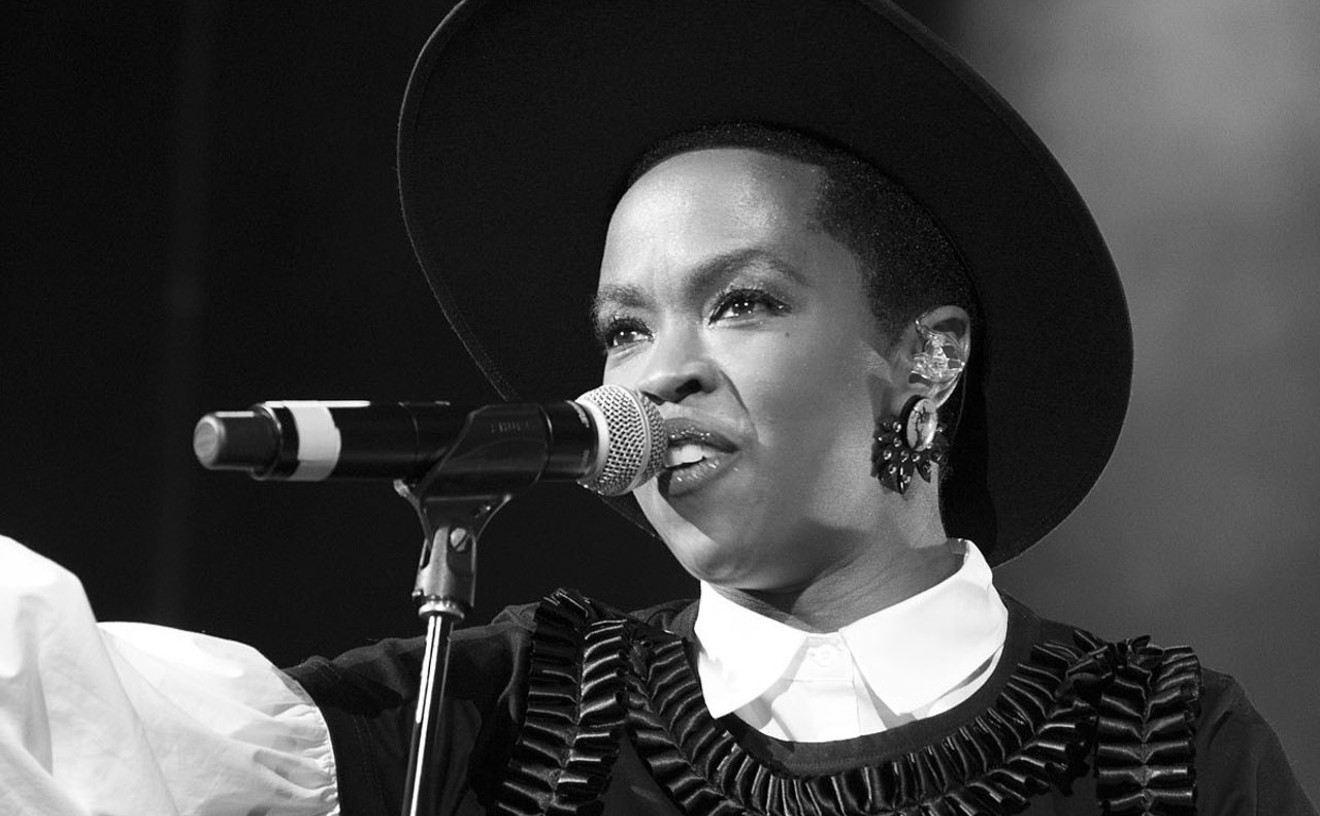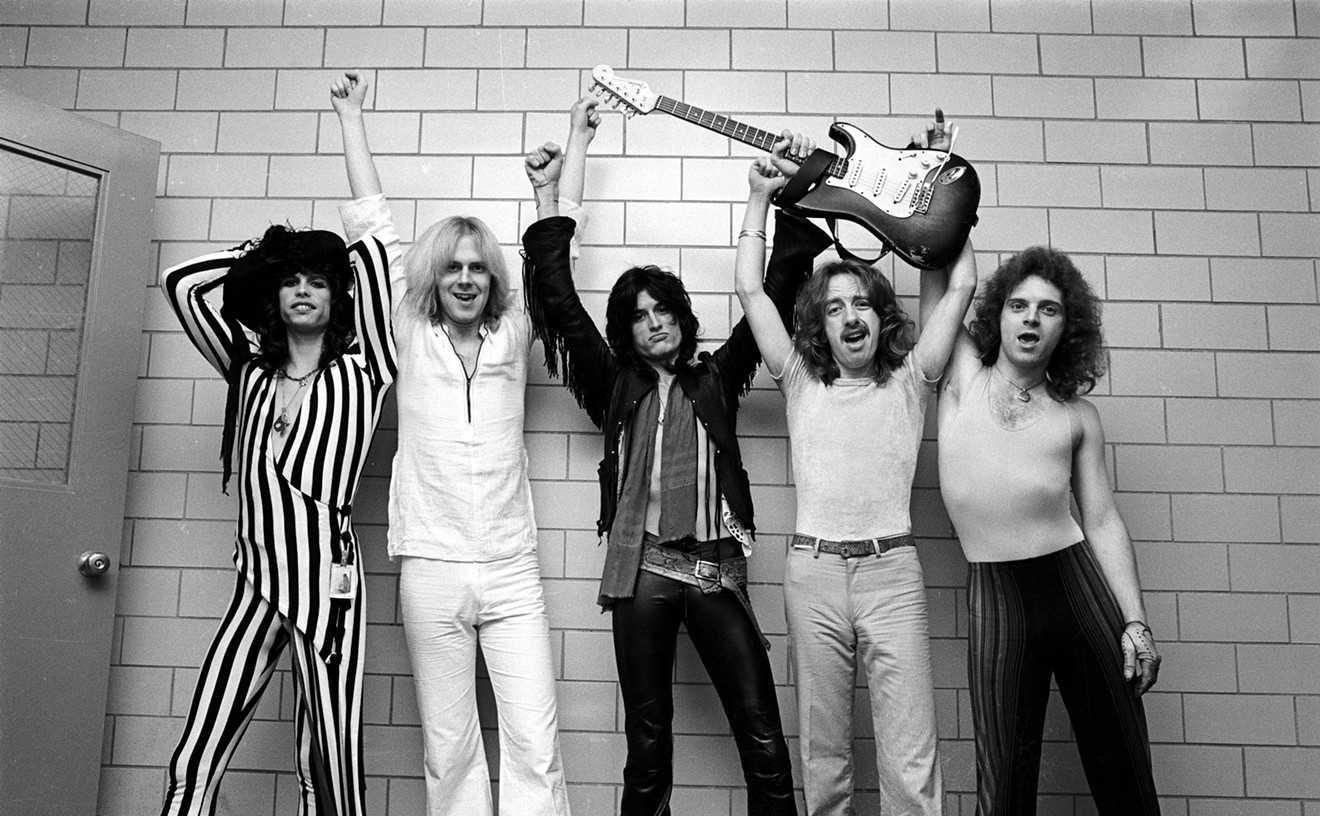It was supposed to be a fun postconcert gathering of friends and groupies. Caterwaul had just finished playing two shows to enthusiastic crowds at the Mason Jar last Sunday, and now the Phoenix-turned-L.A. band was surrounded by nothing but faithful fans. Or so it thought.
"This guy came to our house, and he said he liked the band," relates singer Betsy Martin. "But then he had to explain, `But I'm not a fan.'"
"It was like he was afraid to admit that he liked us," adds drummer Kevin Pinnt in disbelief. "Some people aren't sure whether it's acceptable music."
Sprawled out on the floor of her brother Jeff's north Phoenix apartment, Martin laughs about the previous night's encounter with the closet Caterwaul fan. She's used to people making excuses for liking her band. Martin and crew have come to accept that, except for maybe the vilified Gentlemen Afterdark, Caterwaul is probably the most hated Phoenix band in rock 'n' roll history.
It's hard to account for the animosity some people feel toward the Caterwaulers. You could blame it on Martin's notorious vocal quirks, which range from ear-piercing wails to vaguely nasal warbling. Or it might be because of the singer's sometimes introspective, sometimes out-and-out esoteric lyrics.
But the reason many resent the avant-rock outfit has nothing to do with its music. When Caterwaul was signed to I.R.S. Records after just a year or so together, some grumbled that the baby band hadn't paid its dues. Yeah, it was great that a group from Phoenix was edging toward the big time, they said, but why couldn't the lucky locals have been the Strand or even Shadowtalk, for Christ's sake?
Pinnt says he couldn't understand why some would begrudge the band's success. "We got kind of bewildered and thought, `What did we do wrong?'" notes the drummer, who tore himself away from an especially intense video game to join the interview. "But I guess upsetting some people is just part of the business."
There was one main culprit behind this wave of Caterwaul-bashing, claims Pinnt--none other than Andy Van De Voorde, New Times' tough-to-impress former Sun Tracks editor. "I can remember the day when we were trying to get our first demo tape reviewed in the New Times," recalls the drummer, "and he's asking Fred [Cross, the band's bassist], `So, is this going to be another one of those pompous new-wave bands?' And we were thinking, `Dude, you haven't even heard it!'"
Pinnt figures all the negative press at least served as "backhanded promotion" for the band. "It did get the people who liked us to stand up for us," notes the stickman. But even die-hard devotees couldn't help much when Caterwaul found itself banned from the airwaves of the Valley's only alternative music station back then, the then-extant KEYX-FM. Martin says the Key eventually blacklisted the 'waulies because the Phoenix station never received a letter of thanks for its initial support of the band.
"It was interesting, because we really never tried to screw our hometown over in any way," claims Pinnt, "yet some people tried to put us in the position as if we did. But the tough press and the town not being sure of what they thought of us did end up being good for us in a way. It helped us focus on outside things."
What Caterwaul focused on was establishing itself on the L.A. apres-punk scene. After plugging away with little success in the Valley, the band relocated to L.A. in 1987, and before long the group became a favorite among the big-hair scenesters at club venues like the Scream, as well as a staple on progressive radio stations like KXLU.
Although cynical Phoenicians chalked up Caterwaul's L.A. success story to the trendiness of that scene, the band itself felt vindicated. "After we ruined our reputation in Phoenix, we were able to go to L.A. more established in what we wanted to do," reasons Pinnt.
Caterwaul was dealt a megaboost when I.R.S. chief Miles Copeland took a shine to the band's independent LP, The Nature of Things, and decided to sign the act late in '87. Pinnt calls the band's modest-selling debut EP for I.R.S., Beholden, "more of a press record than a people record. The press really reassured the label that maybe something could develop. It even got as far and maybe as out of hand as people saying, `This is I.R.S.'s next R.E.M.!'"
Last year, Caterwaul followed up the auspicious Beholden with the less startling LP, Pin & Web. The group's new record, Portent Hue, produced by Greg Reely and Skinny Puppy's flamboyant front man David Oglivie, tops all three of Caterwaul's previous vinyl outings. The disc is loaded with impeccable art-pop numbers, from the groove-oriented "Alex' Aphrodisiac" to the lovely ballad "Small Things in Heaven." The latter track proves that there's a lot more to Martin's oft-maligned voice than glass-shattering vocal gimmicks.
Even fans wouldn't call Martin's a "pretty" voice, but it does have more depth and control than it's usually given credit for. The singer's been called a latter-day Dale Bozzio, opting for a quirky, self-consciously experimental vocal style. Pinnt claims that charge is off-base. "This is her natural voice," the drummer argues. "I heard a tape of her singing when she was six or so, and she had the same crazed little voice."
The undeniable range and stridency of Martin's pipes come across best in a small club setting like the Mason Jar. Even the singer's Stevie-Nicks-cum-Cyndi-Lauper get-up--Victorian minidress, lycra biking shorts and a scarf-festooned black cowboy hat-- can't detract from her compelling vocals or from her fellow Caterwaulers' solid chops.
The sizable turnout for Caterwaul's Mason Jar gigs indicates that the band's status may be shifting from local embarrassment to favorite son. "It's nice coming back here on tour," admits Pinnt. "There's a good number of people at our shows now, whereas in our years of living here it was just like our ten friends that would go."
So it seems Caterwaul's "hometown band makes good" story is finally something Phoenix listeners can be proud of, proving that national credibility has wrought welcome changes on the home front. Still, Martin admits, not everyone has been won over.
"Our families and friends live here, so occasionally we still hear things like, `Oh, I was listening to [KUKQ-AM] and they said they were going to take your album outside and melt it in the sun.' So I guess some things never change."










